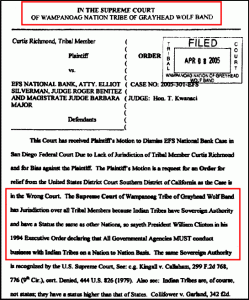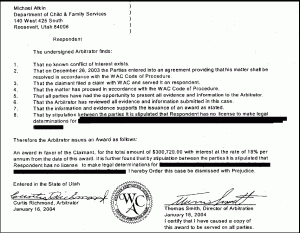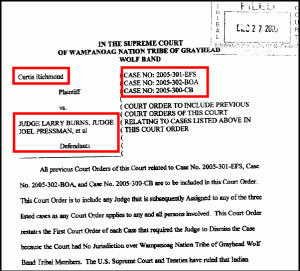Meet Curtis Richmond and the so-called “Arby’s Indians.”
This stupefying drama actually started almost a decade before the fabled meeting inside an Arby’s restaurant in Provo, Utah, on April 18, 2003. The birth of Wampanoag Nation, Tribe of Grayhead, Wolf Band — a sham Utah “Indian” tribe not to be confused with a legitimate Massachusetts tribe with a similar name — dates back to the “Sovereign Citizen Movement” and “Patriot” eras of the 1990s in which Timothy McVeigh was making headlines for blowing up the federal building in Oklahoma City and killing 168 people.
“Mr. [Dale] Stevens . . . had actually started the organization . . . some nine years before that meeting in Provo,” said U.S. District Judge Stephen Friot, in findings of fact and conclusions of law. “Curtis Richmond was admitted to the tribe, because, in the words of Mr. Stevens, he is a believer in fighting for liberty, not because of any heritage as a member of the Wampanoag Nation.”
Friot ruled the tribe a “complete sham.” Richmond now is a central figure in the AdSurfDaily Ponzi litigation.
The Arby’s meeting in April 2003 was important, though, because it established a date from which a bizarre conspiracy evolved that rattled nerves, subjected public officials, attorneys, investigators and bankers to monumental inconvenience and, ultimately, created the stage from which Curtis Richmond introduced himself to a wider audience than just the folks back home in California. He has been a thorn in the side of the judiciary there, too, and was convicted in 2007 of criminal contempt of court for threatening federal judges.

Richmond has never been linked to violence. But he has a deep and storied history of threatening federal judges in court filings. And he has drawn the attention — and ire — of banks in courts from coast to coast. Richmond, who is not an attorney and yet holds the unique distinction of having been banned from the practice of law in Colorado, became a player in a scheme in which he advised people who were being sued by banks for defaulting on credit-card debt to “assign” the debts to him.
This was done by fiat, without the banks’ approval, and was designed to cripple their ability to collect on legitimate debts. Richmond became embroiled in litigation, and turned to a sham arbitration panel and sham “Supreme Court” set up by the sham “Indian” tribe to gum up the mix.
Because the “tribe” itself also was embroiled in litigation — mostly against public servants in Utah — the state became the staging ground for litigation that only can be described as bizarre.
In one case, for example, the “tribe” divined itself the authority to issue license plates. When a member was stopped by a deputy sheriff for having an illegal tag, litigation ensued that ultimately threatened the sanctity of the state and federal court systems and the government’s ability to prosecute criminals and provide public services.
Not even the Utah Division of Child and Family Services was immune from tribal interference and harassment. Indeed, the tribe even divined itself the authority to intervene in family matters.
“A good example of this pattern of racketeering activity would be Wampanoager [Name Deleted To Protect Privacy Of Children,]” victims in the case said. “[Name Deleted] applied for membership in the Wampanoag Nation on October 20, 2002. His ‘application’ was received into evidence at trial as Exhibit 29. It reflects that Dale Stevens is the Tribal Chief, Thomas Smith is the Chief of Ministry of Justice and Terry Campbell is the Chief Minister of Law Enforcement.
“[Name Deleted] later became embroiled in litigation with the Utah Division of Child and Family Services regarding his minor children. [Name Deleted] served Mr. Michael Atkin, a representative of the Utah Division of Child and Family Services, by certified mail, with a demand for payment of $300,000.00, allegedly for breach of contract. This demand, termed a ‘Statement of Account[,]’ advises Atkin that he will be subject to binding arbitration to collect that debt.”
Curtis Richmond, who is being called a “hero” on the Pro-ASD “Surf’s Up” forum, served as the “arbitrator” and approved the fraudulent $300,000 award.

Justice Perverted
“Insisting that their status as tribal members exempts them from state and local laws, Stevens and the other Wampanoagers engaged in a pattern of racketeering activities involving sham arbitrations before an entity known as the Western Arbitration Council,” said victims of the scheme, in court filings.
“The Western Arbitration Council is a dba for a Utah corporation called the Order of White Light,” the victims continued. “The Order of White Light, in turn, claims to be a private ‘ecclesiastical corporation sole’ of which Thomas Smith is the ‘presiding patriarch.’
“Stevens and the Wampanoagers obtained hundreds of millions of dollars in fraudulent arbitration awards against local governmental officials, judges and prosecutors and then

recorded those ‘awards’ as liens against the officials’ property, including the property of Uintah County, Utah, Uintah County Attorney Joan Stringham, former Uintah County Sheriff Hawkins and Uintah County Deputy Sheriff Laursen. The Wampanoagers did this in order to frustrate, harass, interfere with and obstruct local law enforcement so as to continue their respective commercial activities free of governmental regulation,” the victims said.
All of this potentially spells bad news for ASD members.
For scale, consider that the first filing in one of the Utah cases involving Richmond was entered on Aug. 11, 2004 — four and a half years ago. The most recent filing is dated Jan. 14, 2009, and the case file includes 321 separate entries, not taking entries that don’t qualify as formal filings into account.
By comparision, the ASD case has 42 entries since it was opened in August 2008 — and was nearly litigated to conclusion before Richmond entered the fray. If the case drags on interminably — and if people expecting to petition the government for a refund from seized funds have to wait even longer — they can blame it on Curtis Richmond, “Professor” Patrick Moriarty and some of the members of the “Surf’s Up” forum who advocated a scorched-earth campaign against the government.
A linchpin of the stragegy is to send demand letters to litigation opponents, judges and officers of the court by certified mail. The letters demand a specific course of conduct and include a compressed time frame in which the demand must be met. If the demand is not met or if the recipient ignores the letters, the practitioners claim a contract violation has occurred and seek astronomical judgments against the targets of the letters.
If any of this sounds unreasonable and dangerous to you, consider you’re not alone in your concern. In one of the Utah cases, the recipients sued under federal racketeering and mail-fraud statutes — and won. On the eve of an “Indian” trial in Utah, Richmond tried to force Friot to recuse himself from the case, claiming that Friot couldn’t be fair because he “owes Curtis Richmond $30 million in Damages for Violating Curtis Richmond’s Sovereign & Constitutional Rights.”
And Richmond piled on threats: “The Judge Disqualifies Himself Or He Will Face Criminal Charges,” he demanded.
Friot refused to step down. He found that the “tribe” had engaged in racketeering and mail fraud, ordering more than $108,000 in damages to the victims.
Comments
7 responses to “Genesis Of The Utah ‘Indian’ Cases And Why They Could Spell Bad News For ASD Members Who Are Seeking Refunds”
[…] this for some history of Curtis Richmond litigation. Richmond is associated with a Utah Indian tribe a federal judge ruled a “complete […]
[…] Richmond was hailed a “hero” on Surf’s Up. Never mind that he once signed a fraudulent “award” issued by WAC against a family-services worker in Utah for $300,000. […]
[…] was associated with an “Indian” tribe — one a federal judge had declared a “complete sham” in a separate case — and Richmond had purported to be a sovereign being who answered […]
[…] the $250 million judgment sought against a public servant by a sham “sovereign” Utah “Indian” tribe to which […]
[…] another mainstay in the ASD story. Richmond, a pro se litigant in the ASD case, was a member of a sham Utah “Indian” tribe known for filing vexatious litigation, including litigation that resulted in a successful […]
[…] ASD member — Curtis Richmond — has been associated with a Utah “Indian Tribe” a federal judge ruled a […]
[…] case — and yet the cheerleading for Bowdoin continued on Surf’s Up. The forum labeled ASD pro-se litigant Curtis Richmond a “hero” after he accused the judge and prosecutors of crimes in […]